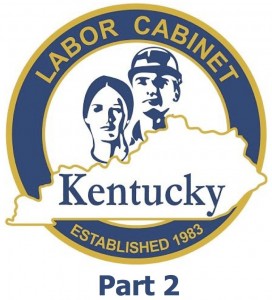 Navigating how to dodge being investigated by the Kentucky Labor Cabinet has become a burning issue of late.
Navigating how to dodge being investigated by the Kentucky Labor Cabinet has become a burning issue of late.
As a quick recap for those who missed our initial blog, our curiosity was piqued regarding the principal violation complaints investigated by the Kentucky Labor Cabinet. We sought to equip our readers with information to sidestep such unpleasant circumstances (and ensuing penalties). Consequently, we journeyed to Frankfort, KY, meeting with the program managers from the Kentucky Labor Cabinet for clarity.
The overwhelming response to the first part of this blog, which you can peruse here, was a clear indication of the pressing concern this subject holds for you.
Considering the recent controversial closure of Lynn’s Paradise Café which saturated local news, we felt it important to provide further advice to help evade such investigations. This abrupt closure served as a stern reminder to the denizens of Louisville about the serious nature of labor laws.
This iconic Louisville restaurant, famed for its eccentric décor and delicious fare, permanently shut its doors following allegations of labor law violations by Kentucky Jobs with Justice.
(Note: The owner, Lynn Winter, declined to comment on her reasons for closing the establishment after a 22-year run, merely stating, “The time has come to move on to new creative ventures.” For a comprehensive story, refer to this article on the Courier Journal’s website.)
This event highlighted to employers the potential dangers posed by even one disgruntled employee, equipped with a social media platform such as Facebook, a platform almost everyone has access to nowadays.
So, let’s turn our attention to preventing such circumstances. Without further ado, let’s revisit the top 10 violations investigated by the Kentucky Labor Cabinet, and discuss strategies to circumvent them.
Here are the latter half, issues 6-10:
Top 10 Violations [As We Heard Them] Investigated By The Kentucky Labor Cabinet (And How To Avoid Them!) Part 2
6. Overtime
The Violation: Employers miscalculate or fail to pay overtime, especially in dual capacity roles.
The Correct Method: Overtime pay for non-exempt employees in Kentucky follows this guideline: per 803 KAR 1:060, employees are entitled to overtime pay for hours worked beyond 40 in a workweek, at a rate not less than one and a half times their regular rates of pay. An employee’s workweek is a fixed and regularly recurring period of 168 hours — seven consecutive 24-hour periods. Overtime pay earned in a particular workweek must be paid on the regular payday for that pay period. For dual capacity roles, the employee’s hourly rate for the week is the weighted average of such rates.
7. Break Time
The Violation: The employer does not provide breaks.
The Correct Method: In Kentucky, employees are entitled to 10 minutes of paid breaks for every four hours of work, in addition to lunch breaks. Employers must offer a lunch or meal break between the third and fifth hour of the shift. This time does not have to be paid, and the employee should be free of any work obligations during this time. Employers should document if an employee chooses to forgo this break.
8. Unpaid Wages
The Violation: The employer fails to pay for all hours worked, or does not issue the final paycheck or pay out vacation at termination.
The Correct Method: Employers should have clear policies in place to manage work, especially with telecommuting and social networking. The employer must pay out accrued vacation leave at termination as per their established policy. Under KRS 337.055, an employee who leaves or is discharged from employment must be paid all wages or salary earned no later than the next normal pay period following the date of termination or 14 days following such date, whichever is later.
9. Prevailing Wage
The Violation: The employer does not pay prevailing wage rates (pertinent only to the construction industry).
The Correct Method: The employer must ensure they understand and comply with prevailing wages defined under Kentucky Revised Statutes 337.505 to 337.550.
10. Independent Contractor
The Violation: The employer misclassifies employees as independent contractors.
The Correct Method: As a general rule, if the employer has any control over the terms of employment, it is considered an employment relationship. Misclassification can deny employees their entitled benefits and protections, and contribute to significant losses to the Treasury, the Social Security and Medicare funds, and to state unemployment insurance and workers compensation funds.
Final Tips:
The best way to avoid an investigation is to maintain accurate time records and implement clear, followed policies.
Are You Compliant? Most Companies Aren’t!
As many companies fail to comply, we’ve created a Free HR Compliance Review tool that provides an instant assessment of your company’s HR risk and effectiveness.
Have more questions for the Kentucky Labor Cabinet?
If you have additional queries for the Kentucky Labor Cabinet, feel free to reach out.











